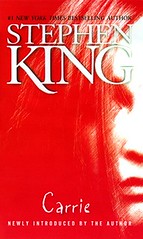
'Salem's Lot / Stephen King
New York : Pocket Books, 1999
Originally published: 1975
xxii, 631 p.
Stephen King's second novel, 'Salem's Lot, is the story of a mundane town under siege from the forces of darkness. Considered one of the most terrifying vampire novels ever written, it cunningly probes the shadows of the human heart -- and the insular evils of small-town America.
So, after reading Carrie, I've been in a sort of Stephen King mode. I'll probably be reading a good deal of his stuff in the coming months. I've started at the beginning, in a way, so 'Salem's Lot sort of came next, and it was... pretty good.
The plot is basically "What if Dracula came to small-town Maine?" And so it is that a very old vampire named Barlow set up shop in a creepy old house in 'Salem's Lot. Most of the story focuses on Ben Mears, a writer who came around the same time to do a novel on the town and on the creepy old house where he had a creepy old supernatural experience as a child. And then basically everyone starts turning into vampires.
The plot is fairly predictable, though I imagine it was a bit more compelling 35 years ago. I wouldn't call it terrifying for that reason, but the narrative propels itself successfully. Some of the plot elements are a little improbable and hokey, notably the Christian elements and the fact that consecrated crosses and hands bathed in holy water will actually glow with a beneficent light in the presence of a vampire. But that I also attribute to the times.
What I found scariest about the novel is not the vampires (whose effect was diminished by the instinctual and irrational fear the characters felt in the air being pounded into the reader's head when they got close) but how the town, though very obviously dying, kept quiet and refused to recognize the destruction around it. The denial speaks to something very real. King captured it well, especially in my favorite character, Parkins Gillespie, the old sheriff.
Anyway, it's a pretty good read, but I don't have much else to say about it. I didn't find it as fascinating as Carrie, perhaps because King tries to make you care about too many characters, and it's a bit of a tall order. I'm going to read The Shining next, which I hope will be more along the lines of what I expect.






